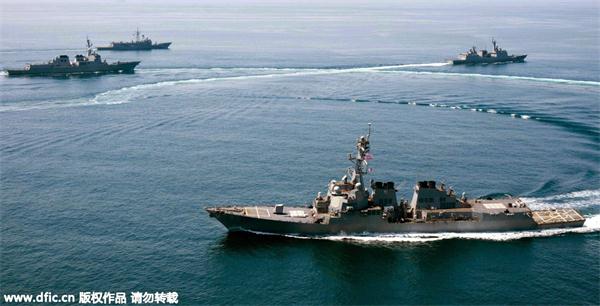ASEAN states warned over US provocation
By Zhang Yunbi (China Daily) Updated: 2016-02-16 07:54
 |
|
The guided-missile destroyer USS Lassen (front) conducts a trilateral naval exercise with the Turkish and South Korean Navy on May 25, 2015. [Photo/IC] |
Increased maritime problems involving the United States could hijack the interests of the Association of Southeast Asian Nations and its members, according to a regional expert.
The comment was made ahead of a two-day gathering with ASEAN leaders hosted by US President Barack Obama on Monday at the Sunnylands estate in California.
Washington stirred tensions in the South China Sea at the end of January when a US navy destroyer intruded in Chinese waters off the Xisha Islands. It was quickly forced away by the Chinese military.
Joseph Matthews, director of the ASEAN Education Center in Phnom Penh, advised ASEAN leaders traveling to the meeting to avoid allowing the US to hijack it and use or exploit its presence against China.
"The region's security is linked with economic prosperity-this is a fact you cannot escape. Unnecessary involvement by a third party that happens to be an outsider could further complicate the issue," Xinhua News Agency quoted him as saying.
The White House Press Secretary's Office said in a news release on Friday, "The US-ASEAN partnership has been important in addressing shared challenges on a diverse range of issues."
These included "upholding international law and standards in the South China Sea".
Reuters said the Sunnylands gathering is aimed at demonstrating Washington's commitment both as a counterweight to Beijing and as an eager trading partner with ASEAN nations.
The Associated Press reported in a commentary that forging a common front and encouraging bolder rhetoric against China over the South China Sea issue "will be a challenge" for those attending the meeting.
Only four of ASEAN's 10 member states are involved in South China Sea disputes, "leading sometimes to conflicting views on handling the long-simmering rifts", the commentary said.
Zhang Junshe, a senior researcher at the PLA Naval Military Studies Research Institute, said Obama and the ASEAN leaders are expected to promote regional peace and stability and to refrain from more provocations.
"ASEAN countries have a clear understanding of the big picture and they know the consequences," Zhang said, referring to past provocations by the Philippines.
Xinhua contributed to this story.






